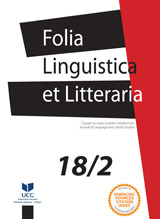DIE FREMDSPRACHENPOLITIK IN DER REPUBLIK MAZEDONIEN UND IHRE AUSWIRKUNGEN AUF DEN SCHULISCHEN DAF-UNTERRICHT
THE FOREIGN LANGUAGE POLICY IN THE REPUBLIC MACEDONIA AND ITS
CONSEQUENCES FOR TEACHING GERMAN AS A FOREIGN LANGUAGE IN SCHOOLS
Author(s): Emina AvdićSubject(s): Education, Foreign languages learning, School education, State/Government and Education, Sociology of Education
Published by: Filološki fakultet, Nikšić
Keywords: German as a Foreign Language; language policy; foreign language teaching; curricula; textbooks; central final exam; External Electronic Testing;
Summary/Abstract: This paper deals with the language policy in the Republic of Macedonia and its effects on foreign language teaching. The focus is placed on German as a foreign language, while other aspects such as native language, minority languages and neighboring language teaching are not within the scope of this paper. There will be a critical discussion of the objectives, strengths and weaknesses of the following governmental regulations for teaching German as a foreign language: a) development of new curricula; b) approval of GFL textbooks; c) the central final exam in GFL; and d) the External Electronic Testing. The purpose of this paper is to show how governmental regulations institutionalize and standardize foreign language teaching, while warranting a certain level of quality, they can hinder students’ expectations and place teachers before great challenges. The paper closes with an overview of how governmental requirements and experience from the teaching practice can be put in a reasonable framework.
Journal: Folia Linguistica et Litteraria
- Issue Year: 2017
- Issue No: 18/2
- Page Range: 195-205
- Page Count: 11
- Language: German

